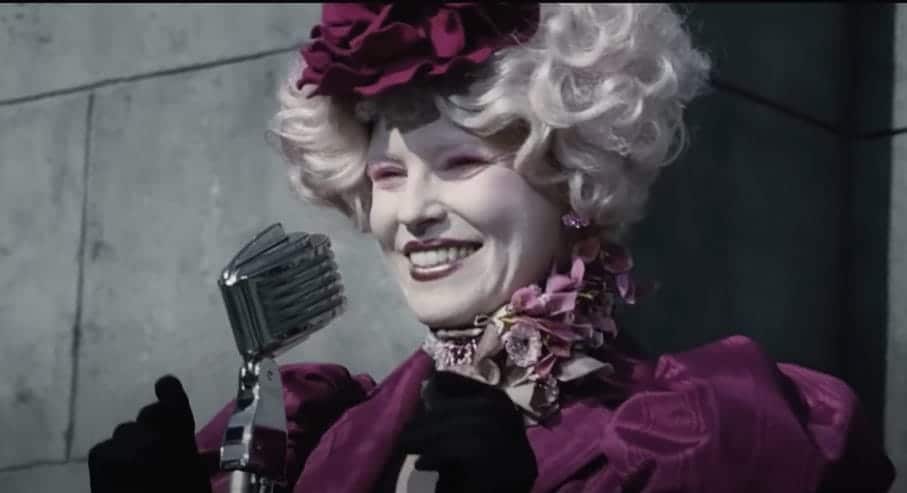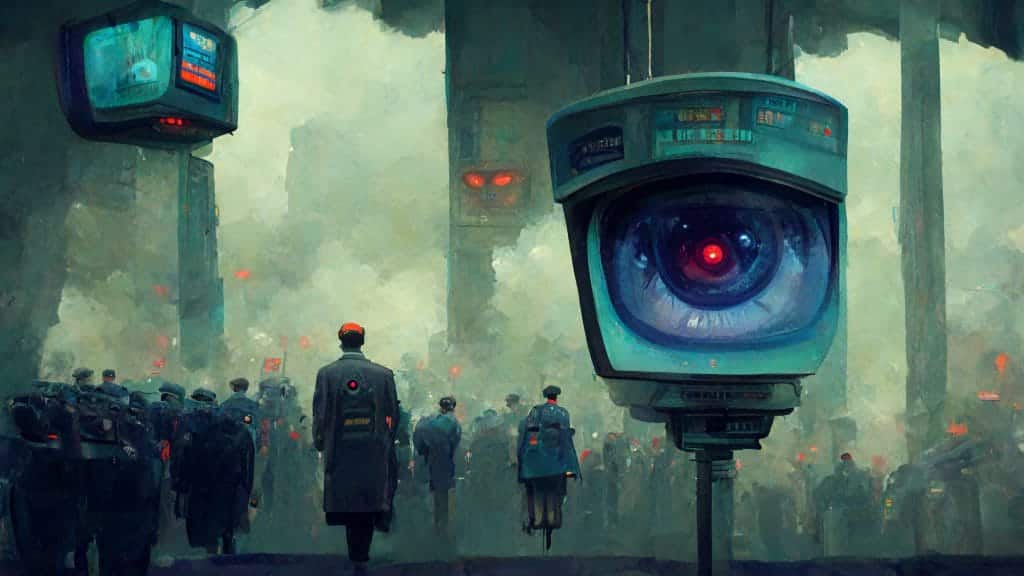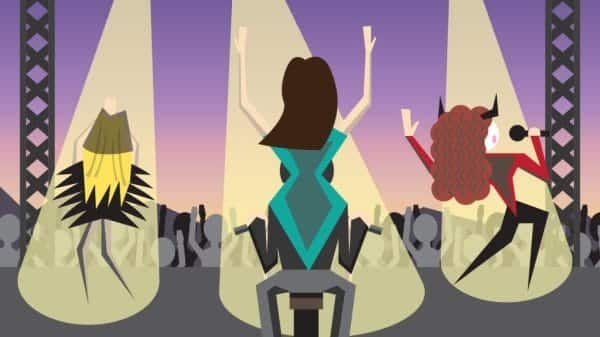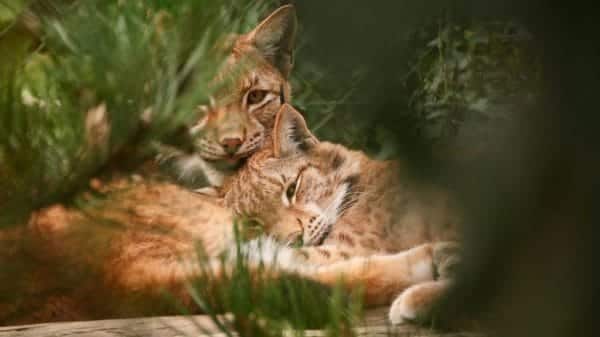The Hunger Games movies have taught a generation the fears and consequences of dystopia and unfair governments. These warnings and themes are more important than ever before. However, like many successful films, this series began as a novel.
The written series by Suzanne Collins has won at least 77 awards. This trilogy has shown striking similarities to reality, with the 66th Annual Grammy Awards quickly becoming a shocking example of just how dystopian life has become.
Fashion
The easiest similarity to spot between Collins’ The Hunger Games and the Grammy Awards is the fashion. The exaggerated and luxurious styles worn by Capitol citizens in the novel mimic the fashion statements made by celebrities on the Grammy red carpet.
Photographed above is Dawn Richard in a fun, campy red gown with sleeves of flowered red branches. Despite its beauty, we must ask just how close we have come to “The Capitol” in Collins’ trilogy. The Capitol is the government and richest city in The Hunger Games universe. Its money, food, and luxury have spoiled its citizens rotten.

The most notable of this dystopia’s citizens would be the novel’s character, Effie Trinket. Effie is the announcer of the Hunger Games participants in each district and quickly draws audiences in with her excessive extravagance when it comes to fashion. She wears the purple floral outfit pictured above in her first scene in the film series. The Hunger Games’ first movie installment was released in 2012; however, the first novel was published earlier in 2008.
Collins’s novels are read as a far-fetched dystopian universe. The districts represent American regions and the Capitol is a call-out to the country’s governmental infrastructure; however, the books are a fictional tale. This is why the evident similarities in the fashion and extravagance of the novels and our reality are so jarring.
Themes of dystopia

Dystopia as a genre did not begin with The Hunger Games. Suzanne Collins is preceded by authors such as George Orwell and Ray Bradbury, who focused on societal collapse and abuse of control. Dystopia is an offset of science fiction which focuses on the broken reality of worlds struggling to appear as perfect.
“Through the first half of the 20th century, the loss of individuality due to rampant mechanization and conformist mass society frequently served as cause for alarm for the future.”
Lawrence R. Samuel Ph.D., March 30, 2020
Outside of the shimmering makeup and whimsical gowns, deeper themes present in The Hunger Games are also becoming apparent in American award shows and celeb culture.
The Hunger Games series saw a resurgence on TikTok before its latest film installment. This makes it easier for younger generations to heed the warnings given in both the movies and novels. That is why the 66th Annual Grammy Awards are raising some serious concerns.
Political conflicts
In Collins’ novel, the games themselves served as a reminder to the districts of their rebellion. Sending in two children to fight to the death for food rations was both a reminder and a punishment. While the Grammy Awards and celebrations like it are not intended as punishment, they do work as a reminder of problems in our society.
Award shows are supposed to be filled with high-profile celebrities, expensive outfits, and tear-jerking acceptance speeches. However, these events often ignore the very real problems many face day-to-day.
Annie Lennox used her time during the Grammys tribute to Sinead O’Connor to call for a ceasefire in the Israeli-Palestinian conflict. While the event usually strays away from major political takes, some crises cannot be ignored. Celebrities such as Boygenius also couldn’t step away from political outcry, as they adorned ceasefire pins on their red carpet looks.
Class
Another comparison between award shows and The Hunger Games’s Capitol is the class division. District 12, where the novel’s main character Katniss is from, is the poorest and smallest district located in Appalachia. In this dystopia, they struggle to obtain food and work in the mines to afford a living and avoid beatings.
The very real Appalachian society has similar struggles. Coal mining is often attributed to this region.
The Southern Appalachian region has long been one of the largest sources of coal in the world. For generations, miners have been digging and blasting their way into the rugged mountains of Kentucky, Virginia, West Virginia, Tennessee and Alabama to unearth thousands of tons of what are commonly called “black diamonds.”
The Moonlit Road.com
While District 12 in the novel faces these horrible conditions, The Capitol is gluttonous. Effie Trinket is always described as wearing elaborate gowns and other citizens never go hungry. There is a detail mentioned in the second film, Catching Fire, where it is revealed that The Capitol’s citizens take a supplement to keep them from getting full just so they can keep eating.
While no such supplement is offered at American award shows, the stark difference in class is impossible to ignore. Celebrities arrive on the red carpet in designer gowns and thousand-dollar jewelry pieces. They come and go in limousines, surrounded by assistants and stylists, all while getting their photos taken by photographers fighting for a picture that will pay the bills.
Representation
This year’s Grammy Awards has received some flack for the nominees in each category. Some argue that the award show purposefully leaves out its more diverse categories from being televised.
When it comes to the Latin music categories historically, however, they have hardly ever made the telecast – despite the fact that Latins now represent nearly 20% of the U.S. population, and that Spanish is the second most-consumed language in music in the country.
https://www.billboard.com/author/leila-cobo/
Social media also went into an uproar when Taylor Swift won Album of the Year. Many argued that Beyonce’s “Renaissance” was deserving of that title.
Much of the outrage concerning the award show was due to its apparent lack of diversity and modernity when it comes to selection. The Hunger Games showcases the same issue of representation when it comes to the districts and their participants in the games.
District 11 is described as the district of agriculture. In the movies, this district’s competitors are always Black. This is a metaphor for the role African Americans played in the history of the United States as a country and the lack of credit shown for it.
The lack of representation in the Grammys categories and winners is a direct reflection of the lack of diversity in many scopes of society. But people are starting to notice.
While it can be a scary acknowledgment that award shows are starting to look like Capitol events from a dystopian novel, it is just another reminder to remain alert and curious at all times. It is okay to be the audience of these shows and not their celebrity spectacle. That is what the majority of the population will end up being. But don’t let these jarring comparisons scare you into mundanity or horror. Dystopia as a genre began as a warning, not a declaration.














